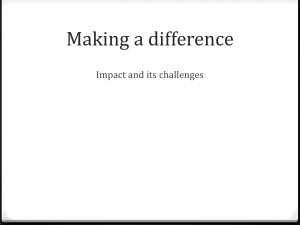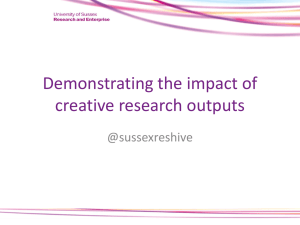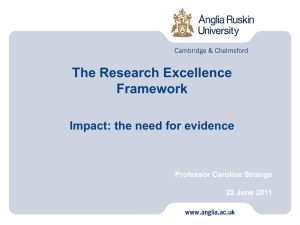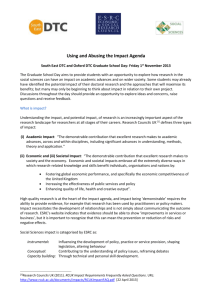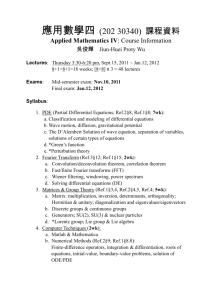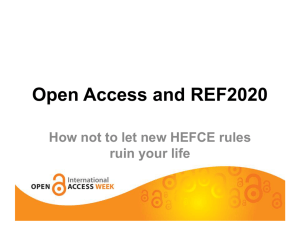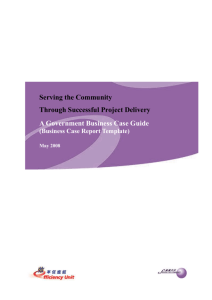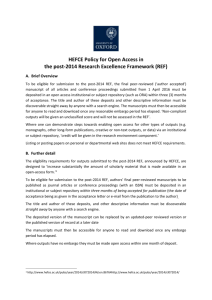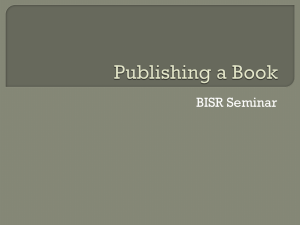recognise only those works which are available in Open
advertisement
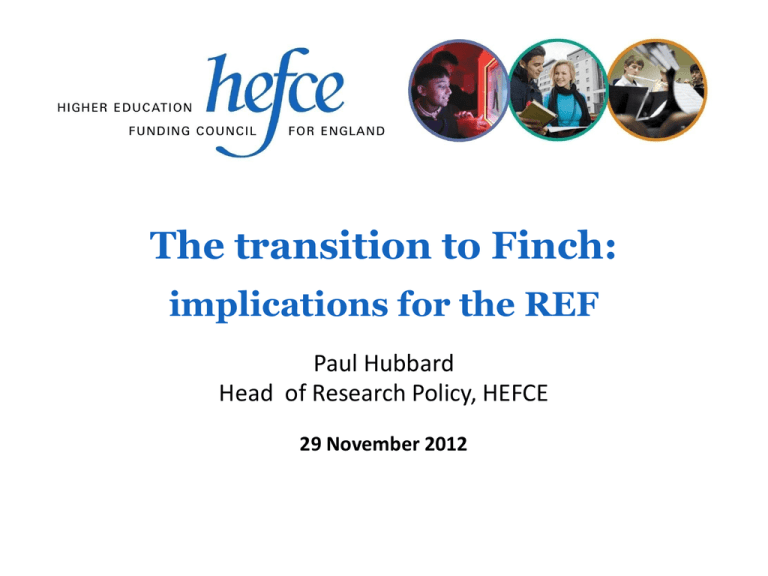
The transition to Finch: implications for the REF Paul Hubbard Head of Research Policy, HEFCE 29 November 2012 Policy background: some principles Research is: A process of investigation leading to new insights, effectively shared Dissemination is an integral part of the research process, not an add-on Ensuring that findings are disseminated is the responsibility of all those undertaking and managing research Policy background (2) Prompt and effective dissemination of research findings has benefits including • Improving the efficiency of the research process: researchers have easy immediate access to their colleagues’ findings; and findings are exposed to productive scrutiny, challenge and debate • Improving the impact of research findings: actual and potential research “users” can see what work has been done that they might find helpful and who did it • Encouraging public support for science: the public who paid for the research can see that their investment is well used to fund robust, timely investigation and what came of this Some trends to note Some interesting recent and current developments • Major research funders mandating OA publication: UK research councils, Wellcome, EU (FP7), NIHR (US) • FRS-FNRS in Belgium requires deposit in a repository of material cited in grant applications • Growth in online OA journals • Experiments with online peer review • Experiments with online publication of monographs, of book chapters (Intech) • Continuing growth in institutional repositories Questions for researchers Researchers should ask themselves: • What have I found? • Who might benefit from knowing? • What is the best way to tell them? Why act now? “Removing paywalls that surround taxpayer funded research will have real economic and social benefits. It will allow academics and businesses to develop and commercialise their research more easily and herald a new era of academic discovery. This development will provide exciting new opportunities and keep the UK at the forefront of global research to drive innovation and growth.” David Willetts, July 2013 What is HEFCE doing? HEFCE welcomes the Secretary of State’s response to the report of the working group on expanding access, which establishes a clear policy direction for the dissemination of publicly funded research findings. We will continue to press forward with our work in this area within the framework set out in the response. As a first step, we would like to make clear that institutions can use the funds provided through our research grant to contribute towards the costs of more accessible forms of publication, alongside funding from other sources. - contd… What is HEFCE doing? (2) The Council intends to consult the higher education sector on how to implement a requirement that research outputs submitted to any future Research Excellence Framework (REF) should be as widely accessible as possible at the time. This would not affect the current REF due to complete in 2014. The Research Excellence Framework REF is: • A high profile national process for research quality assessment and assurance • A means of identifying the very best research produced in the UK over a period • A valuable tool for influencing the behaviour of researchers and research managers Open Access in REF 202o The principle: Work submitted for assessment in any REF exercise after 2014 shall be as freely available as may be possible , and reasonable to require, at the time • Having regard to practical constraints (publishing timescales against date of full announcement) • Having full regard to the policies and requirements of other research funders at the time (the “full going rate” ) Open access in REF 2020 Some issues to resolve • Which formats: journals and conference proceedings plus? • What level of open access: embargo periods • Which version of the text? • Available where? (institutional repositories) • Timing, phasing and allowing due time for compliance • Monitoring/verification What next? We now propose: • To move in concert with the other UK HE funding bodies, and other research funders, as far as possible • Early informal consultation on issues to be addressed • More formal consultation in early 2013 • Clear timely announcement of requirements for the next REF • This has no implications for REF 2014 Thank you for listening a.name@hefce.ac.uk
